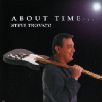In last months column I talked about the do's and don'ts regarding the recording of your own CD. This month I'd like to talk about the mixing process.
Mixing is where your music comes to life. It is the time when you get to add the sweetening effects that you reluctantly stayed away from during the recording. The most common effects are reverb, delay, equalization and compressing or limiting. Reverb and delay give the warmth and depth to an instrument or vocal and also help the mix to blend together and become as the engineers call: "transparent" This transparency is very evident in great CDs when you know what to listen for. Next time you put on a favorite CD, notice how you can pick out all of the instruments, vocals and percussion. This is the sign of a transparent mix. Everything being played should be discernable and the stereo field should sound like a band. That usually means that the vocals and the drums should be in or near the center sounding almost between the speakers. The other instruments should be distributed according to taste around the stereo field.
Use effects sparingly, especially reverb. Too much reverb can tend to diminish punch and presence and can make the track sound too "wet" A good reverb unit is essential. As a general rule of thumb: The better the reverb unit, the better the reverb. I tend to like a plate type reverb on my guitar. I start out with the time set at @ 2.8 seconds and the pre-delay at 75 mls. The level is set according to taste.
Delay is a great effect for both vocals and guitar. The newer delays are digital and I've found that they sound a bit brittle and cold compared to the old analog units. To warn them up I take some of the high end off. This is usually one of the adjustable parameters on the device.
The best rule of thumb I can think of for setting the delay time is to set it so that it is in time with the music. There are commercial charts available that give the correct dealy settings for various tempos, but I think it can be done just as effectively by simply listening to the track and setting the delay time to repeat in quarter or eighth notes. I usually set the delay for little of no feedback. Feedback is the number of repeats heard after the original sound. One repeat sounds the best to me in most cases.
Equalization is a must for both the bass guitar and drum sound. The setting of the drum and bass EQ for great records is an art and is totally subjective. What I do is bring to the studio a CD that I really love and is the style of music that I'm recording. I then set the EQ as best I can to duplicate the sound I'm hearing on the CD. I've seen great engineers do this for many years. I also like plate reverb for drums. The drums should be distributed in the mix to sound from left to right as the drummer plays around the kit. Pay close attention to the kick and snare drums as they are very important to the sound of the CD.
Bass guitar usually sound more punchy when is compressed or limited a bit. Again the better the compressor the better the sound.
The mix of vocals is very critical. Reverb sweetens them up and I usually choose a small room reverb. Take a bit of high end off if you are using a digital reverb unit.
As a final note I'd like to say that the final mix is a subjective thing and should be decided on over a period of time. After you've spent a 12 hour day in the studio mixing your song your ears are probably fatigued. I would suggest that you wait a couple of days and listen again and again to see if it is exactly what you want. Make yourself a work cassette or CD and play it in several other decks: Car,home,office, etc. remember the final mix is final.
That should get you started. In next months column I'll talk about mastering, duplicating houses, graphic design, packaging and getting your music out to the people. Until then good luck and God Bless America.
Steve Trovato is a top flight guitarist from California with countless credits to his name.
Critics have labeled him 'the great chameleon' because of his ability to authentically perform in any style of guitar music.
His debut instrumental CD is entitled "About Time...".
